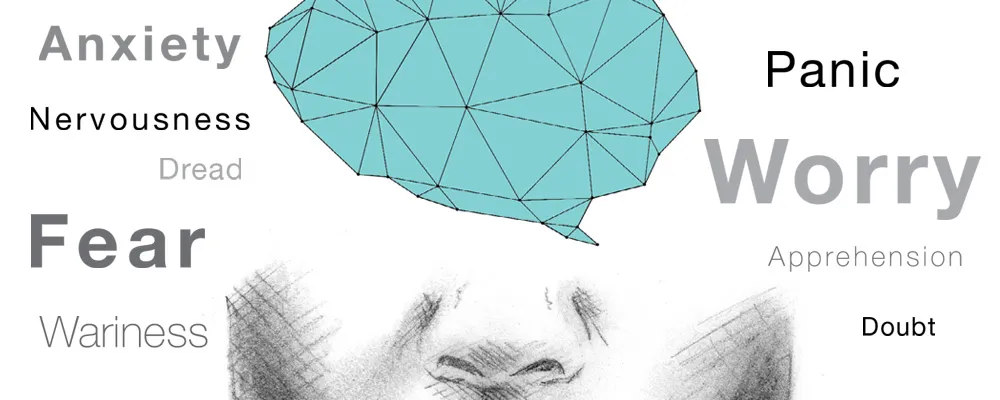- Home
- >
- APU Articles
- >
- News Article
The Fear Factor: Recognizing and Overcoming this Classroom Obstacle
October 12, 2015 | Written By T. Scott Bledsoe and Janice Baskin; illustration Vanessa Esparza ’15 and Connor Fisher ’16

Most people learn to control these emotions. In fact, success in life requires it. Many develop coping skills through participation in sports, church groups, school, or social activities. However, the multitude of factors involved in starting life at college can prove overwhelming for some: negotiating a new physical environment, being away from family, and stretching oneself socially and academically, to name a few. Even the most confident students may become overwhelmed in a cycle of anxiety that impairs academic performance and perpetuates that state of discomfort.
Constant fear or anxiety can hinder learners’ attempts to read and understand their academic materials. It can cause physical symptoms such as shortness of breath, nausea, headaches, chills, sleeplessness, and digestive issues. Cognitively, the student may be unable to focus or concentrate, or may become emotionally agitated or excessively nervous. Such levels of fear may result in inappropriate class behavior, poorly done or missing assignments, frequent absences, or dropped courses.
It is also important to realize that behaviors that appear uniform from student to student, such as anxious glances or nervous twitches, may have vastly different meanings. For many, the classroom represents a platform for academic success or a means to building relationships with others, a place where a professor serves as a potential source of guidance and mentorship. But for others, a professor may be perceived as a distant, unforgiving, and judgmental figure, and the classroom an emotional minefield. Each student holds a mental template of classroom environments composed of incidents both positive and negative from earlier occurrences in school and other life experiences, and brings resultant fears into the classroom. Individuals with disabilities, past traumas, or unique historical backgrounds (e.g., being poor but attending an affluent school) may experience deep-seated fears fraught with painful memories. Researchers on this topic contend that culture can also play an important role in a person’s ability to cope with fear, especially when the learning process takes place in a markedly different environment from the one in which the student was raised. Additionally, studies indicate that this phenomenon is not exclusive to undergraduates—graduate students and even professors may experience fears associated with academic challenges.
Our brains play an integral role in maintaining cognitive and biological functioning. Students who suffer persistent levels of fear actually experience overload in the form of threat-based signals occurring in the central nervous system. On a cognitive level, they may interpret normal situations in a very suspicious manner, as when an innocuous gesture made by one person is taken as a hostile threat by another. Biologically, brain functions may shift to accommodate the continuous threats perceived by the student. Brain structures such as the amygdala (emotion processing), hypothalamus (sensory balance), hippocampus (memory formation and organization), and prefrontal cortex (executive planning) become overloaded, resulting in a snowballing effect of undue stress and its resultant negative effects on learning.
Parents, family members, and friends can help students overcome these fears by educating themselves about fear and its impact, and recognizing that some fears may be associated with factors outside the classroom (e.g., many students juggle jobs and extracurricular activities, and experience relational challenges amongst friends, family, and the opposite sex). Also, when someone recognizes signs of anxiety in the student, immediate and positive feedback and clear communication about feelings often helps defuse the situation and alleviate the fear. Further, those in a student’s support system should learn about campus resources designed to assist learners at all levels. Azusa Pacific University provides a number of ways to help students in distress through the University Counseling Center (home of the Care Team), the APU Community Counseling Center, and various offices such as the Learning Enrichment Center, Writing Center, Academic Advising and Retention, Campus Pastors, Residence Life, and Student Life.
Initially, many APU students experience a plethora of emotions and jittery feelings that tend to dissipate over the semester. Yet for a small number, problematic emotions persist and hinder the ability to meaningfully connect with their coursework. By becoming aware of these fears and maintaining open communication, we can help promote a proactive and less-stressful learning environment.